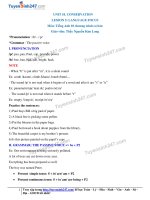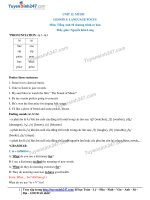Tiếng anh 11: Bài giảng unit 6 language
Bạn đang xem bản rút gọn của tài liệu. Xem và tải ngay bản đầy đủ của tài liệu tại đây (613.71 KB, 5 trang )
CHUYÊN ĐỀ: UNIT 6. GLOBAL WARMING
BÀI GIẢNG: LANGUAGE
MÔN: TIẾNG ANH LUYỆN THI THPTQG
CÔ GIÁO: HOÀNG XUÂN - TUYENSINH247.COM
VOCABULARY
Activity 1. Complete the sentences with the right form of the words/phrases from 3 in GETTING
STARTED.
Hướng dẫn giải:
1. carbon footprint
4. ecological balance
2. infectious diseases
5. heat-related illnesses
3. emissions
6. climate change
PRONUNCIATION
Intonation on yes-no questions and echo questions
An echo question is a type of question that repeats part or all of a sentence that someone has just said.
We use echo questions when we do not completely hear or understand what a speaker has said, or when we
want to express surprise or doubt about it. Echo questions are usually spoken with a rising intonation. We
usually expect the speaker to repeat or confirm the information.
Example:
A: Climate change presents a dangerous threat to the human race.
B: A dangerous threat to the human race?
Activity 1. Listen and repeat these sentences, paying attention to their rising intonation
1 Truy cập trang để học Toán – Lý – Hóa – Sinh – Văn – Anh – Sử
- Địa – GDCD tốt nhất!
Activity 2. Listen and mark / (rising intonation) on the echo questions. Then practise read the
exchanges.
1. A: Most of the environmental problems are man-made.
B: Man-made?
2. A: Scientists are concerned about the effects of global warming.
B: Scientists are concerned about what?
3. A: I cycle to work every day.
B: You do?
4. A: By 2050, rising temperatures could lead to the extinction of a million species.
B: The extinction of a million species?
5. A: In order to save our environment, we should reduce our use of paper products.
B: We should do what?
GRAMMAR
Perfect participles in clauses of time and reason.
- Having planned the content, we're now looking for supporting information.
⟶ After we have planned the content, we re now looking for supporting information.
- Having treated the environment irresponsibly, humans now have to suffer.
⟶ Because/Since humans have treated the environment irresponsibly, they now have to suffer.
Ý nghĩa:
- chỉ hành động xảy ra trước một hành động kế tiếp.
- chỉ ra nguyên nhân gây hệ quả ở mệnh đề chính.
Activity 1. Work in pair. Underline the perfect participles in the sentences in 4 in GETTING
STARTED. Then rewrite the sentences using after/then or because/since.
Hướng dẫn giải:
- Having planned the content, we're now looking for supporting information.
⟶ After we have planned the content, we re now looking for supporting information.
- Having treated the environment irresponsibly, humans now have to suffer.
⟶ Because/Since humans have treated the environment irresponsibly, they now have to suffer.
Activity 2. Match the two parts to make complete sentences.
2 Truy cập trang để học Toán – Lý – Hóa – Sinh – Văn – Anh – Sử
- Địa – GDCD tốt nhất!
Hướng dẫn giải:
1. e
2. c
3. a
4. b
5. g
6. h
7. f
8. d
Activity 3. Rewrite the sentences using perfect participle.
Hướng dẫn giải:
1. Having identified the causes of global warming, we worked out some solutions to reduce its effects.
2. Having used up the fossil fuel resources in their country, they have to find some types of alternative
energy.
3. Having cut down the forests to make way for farming, now local people have to suffer severe floods. /
Having cut down the forests to make way for farming, now they have to suffer severe floods.
3 Truy cập trang để học Toán – Lý – Hóa – Sinh – Văn – Anh – Sử
- Địa – GDCD tốt nhất!
4. Having read the report on how the burning of petrol in cars contributes to climate change, we decided to
sell our car and get a bicycle instead.
5. Having been informed about the bad effects of chemical fertilisers, the farmers started using them
sparingly on their farms. / Having been informed about the bad effects of chemical fertilisers, they started
using them sparingly on their farms.
6. Having talked with the environmentalist, we changed our attitude to nature.
7. Having ignored warnings about global warming for more than 20 years, people have to suffer its effects
now.
8. Having learnt that humans are responsible for global warming, we were determined to reduce our carbon
footprint.
Perfect gerunds:
We can use the perfect gerund to emphasise that an action happened in the past, before the past action
denoted by the main verb of the sentence.
Example:
He apologized for having made us wait so long.
It can be used in the following structures:
(1) verbs + (O) + preposition + having P2
apologise (to sb) for
criticise sb for
accuse sb of
punish sb for
admire sb for
praise sb for
blame sb for
thank sb for
congratulate sb on
suspect sb for
(2) verbs + having P2
deny
remember
admit (to)
recall
forget
regret
mention
Ex: She denied having broken the flower vase.
4 Truy cập trang để học Toán – Lý – Hóa – Sinh – Văn – Anh – Sử
- Địa – GDCD tốt nhất!
Hướng dẫn giải:
1. The students in Group 11G were praised for having planted the most trees in the schoolyard in the Tree
Planting Competition.
2. The police suspected Mike of having cut down the oldest tree in the park.
3. He denied having dumped lots of rubbish onto the beach.
4. Thank you for having saved the lives of hundreds of wild animals.
5. They regretted having hunted and killed many wild animals.
6. The factory was heavily fined for having dumped tons of toxic waste into the river.
7. Denis was rewarded for having taken an active part in the Green Summer activities.
5 Truy cập trang để học Toán – Lý – Hóa – Sinh – Văn – Anh – Sử
- Địa – GDCD tốt nhất!









